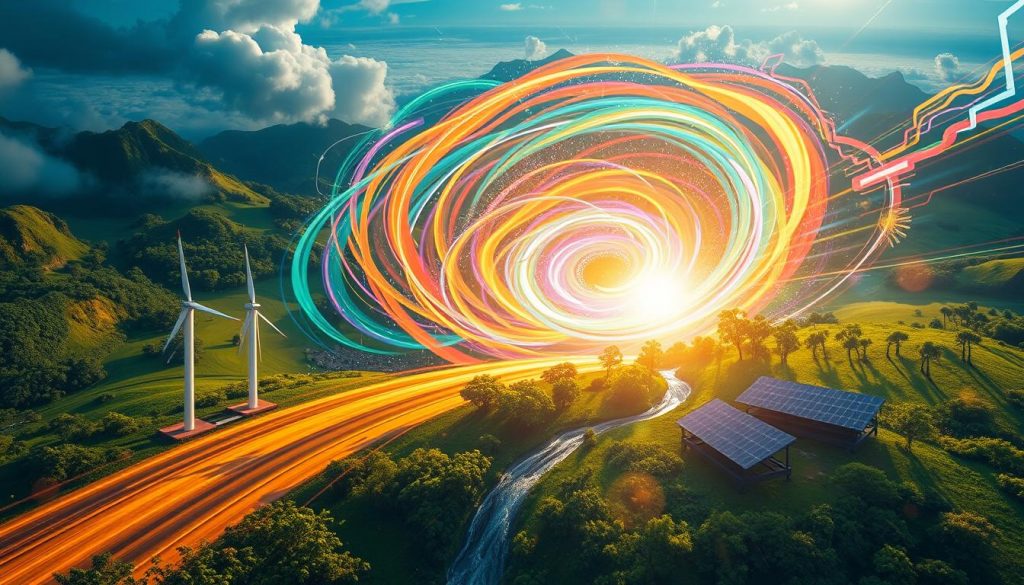Vortex energy: A forgotten scientific concept.
Vortex energy is a fascinating concept that has been largely forgotten in modern times. But, with the growing interest in sustainable development and renewable energy, it’s essential to revisit this concept. We should explore its potential applications in the field of renewable energy and sustainable development.
Anúncios
As we delve into the world of vortex energy, we’ll discuss its scientific principles and natural manifestations. We’ll also look at its potential uses in modern technology. This includes its role in sustainable development and renewable energy, and how it can contribute to a more sustainable future.
By understanding vortex energy and its relationship to sustainable development and renewable energy, we can unlock new possibilities. We can explore the potential of vortex energy in the context of renewable energy and sustainable development. This will help us create a more sustainable future.
Understanding the Fundamentals of Vortex Energy
Vortex energy is based on scientific principles that explain how energy moves in the universe. The vortex theory says everything is linked by a universal energy field. This idea has been studied, like Lord Kelvin’s work on luminous waves in 1884.
Anúncios
To understand vortex energy, knowing the energy systems that control it is key. These systems involve complex interactions between particles and fields. They can be explained with math, like the equation I = n(n – 1)/2 for particle interactions.
Important parts of vortex energy include:
* The way matter and energy spread out in the universe shapes spacetime
* Vacuum energy is linked to quantum changes
* A vortex’s effect can reach about a quarter to half mile from its center
These points are all linked by the scientific principles of vortex theory. It helps us understand how energy works in the universe.
The Historical Evolution of Vortex Energy Studies
Vortex energy has fascinated people for centuries. Ancient civilizations were among the first to explore its mysteries. By looking at the historical context of vortex energy studies, we can see how our understanding has grown.
From Descartes’ early theories to the 20th century’s scientific discoveries, the study of vortex energy has changed a lot. It has been used in physics, engineering, and math. This has helped us understand its principles and uses better.
Some important moments in vortex energy studies include:
- The discovery of the vortex atom theory by William Thomson (Lord Kelvin)
- The development of the vortex theory of gravity by Henri Poincaré
- The application of vortex theory in fluid dynamics and aerodynamics
By knowing the historical context and scientific discoveries that shaped our view of vortex energy, we can see its importance. It shows how it can be used in today’s technology.
| Year | Discovery | Contributor |
|---|---|---|
| 1644 | Vortex theory of gravity | René Descartes |
| 1867 | Vortex atom theory | William Thomson (Lord Kelvin) |
| 1900s | Application of vortex theory in fluid dynamics and aerodynamics | Henri Poincaré and others |
Scientific Principles Behind Vortex Energy Systems
Vortex energy is based on vortex motion and energy transfer. Understanding these scientific principles helps us see the power of vortex energy systems. Vortices have different speeds of fluid flow, making them important in turbulent flow.
Looking into vortex dynamics, we find that the fastest fluid flow is near the axis. This speed decreases as you move further away from the axis. This knowledge is key for making vortex energy systems work well. They use the power of vortices to transfer energy efficiently.

- Velocity increases proportionally with distance from the axis in rigid-body vortices
- Particle speed is inversely proportional to distance from the axis in irrotational vortices
- Vortex formation is impacted by boundary layer thickness and separation
These rules are vital for designing vortex engines. These engines could make power efficiently and with little loss of energy.
Using scientific principles of vortex motion and energy transfer, we can find new ways to make energy. For example, vortex engines might make electricity better than old methods.
Natural Manifestations of Vortex Energy
Vortex energy is more than just a theory. It’s seen in natural manifestations all around us. Whirlpools and tornadoes show us the power of vortex energy in nature.
Places like the Great Pyramid in Egypt and Machu Picchu in Peru are famous for their vortex energy. They’re believed to help with spiritual growth and well-being. Stonehenge in the UK is another site known for its unique energy patterns.
In Sedona, Arizona, there are vortex sites with different energies. Cathedral Rock and the Chapel of the Holy Cross are feminine. Airport Mesa and Bell Rock are masculine. People visit these places to feel the energy patterns and grow spiritually.
- Enhanced spiritual development
- Increased sense of well-being
- Improved emotional balance
- Heightened sense of awareness
| Vortex Site | Type | Energy Pattern |
|---|---|---|
| Cathedral Rock | Feminine | Receptive |
| Airport Mesa | Masculine | Projective |
| Bell Rock | Masculine | Projective |
| Boynton Canyon | Both | Balanced |
Applications of Vortex Energy in Modern Technology
Vortex energy is being explored in many modern technology areas, like energy systems and vortex-based applications. It’s especially promising in vortex-based energy systems. These systems could change how we make and use energy.
Vortex-based energy systems have big advantages. For instance, Vortex Bladeless made a wind turbine that costs 53% less than old ones. They also cut down operational costs by more than 50%.
Vortex energy is also used in vortex coils. These coils could replace all current coils. Research shows they can produce 458% more energy than they use.
Vortex energy has a huge potential in modern tech. It’s used in renewable energy, materials science, and advanced manufacturing. As research grows, we’ll see more cool uses of vortex energy soon.
| Technology | Benefits | Applications |
|---|---|---|
| Vortex-Based Energy Systems | Reduced energy losses, increased efficiency | Reneable energy, power generation |
| Vortex Coils | High energy output, reduced input | Advanced manufacturing, materials science |
| Vortex Bladeless | Reduced manufacturing costs, increased efficiency | Wind power generation, renewable energy |
The Role of Vortex Energy in Sustainable Development
Vortex energy is becoming a key player in the move towards sustainable development and renewable energy. It offers a way to create energy systems that are both efficient and good for the environment.
There are exciting projects underway. For example, 110 MW of wind and solar projects are being built. This will save around 126,000 tons of CO2 each year.
Working with companies like World Energy GH2, Vortex Energy is pushing the boundaries of renewable energy. They have received $1.08 million to develop new technologies for sustainable development.

Here are some key facts about Vortex Energy’s role in sustainable development:
- They have delivered over 450 MW of renewable energy so far.
- They have a pipeline of over 3 GW in wind and solar projects.
- They are also working on over 2 GW in battery energy storage projects.
- With 17 years of experience, they are leaders in the renewable energy sector.
| Project | Capacity | Energy Production | CO2 Emissions Reduction |
|---|---|---|---|
| Onshore Wind | 53 MW | 90 GWh/year | 63,000 tons/year |
| PV Solar | 57 MW | 90 GWh/year | 63,000 tons/year |
Challenges and Limitations in Harnessing Vortex Energy
Researchers and scientists are exploring vortex energy’s potential. They face many challenges and limitations. One big issue is the technical challenges of capturing this energy.
For example, bladeless wind turbines use vortex shedding to make electricity. But they don’t have as much energy as traditional wind turbines.
Some main limitations of bladeless wind turbines are:
- They are less efficient than traditional wind turbines
- They cost more because of their complex technology
- There’s not much data on how well they work over time
Despite these challenges, companies like Aeromine are pushing forward. They’re working on new, innovative ways to use wind energy. Their technology needs less space than solar panels, which is great for cities.
But, we still need to solve the technical challenges of vortex energy to use it fully.
To beat these limitations, scientists are looking at new designs and materials. For instance, the Danish Technical University is working with Aeromine. They’re testing performance and improving how they estimate energy production.
By tackling the challenges and limitations of vortex energy, we can make it work better. This will help us move towards a greener future.
| Technology | Energy Density | Cost |
|---|---|---|
| Bladeless Wind Turbines | Lower | Higher |
| Traditional Wind Turbines | Higher | Lower |
Future Prospects and Research Directions
Research in vortex energy is moving forward, bringing new emerging trends and chances. The future prospects look bright, with uses in renewable energy and advanced materials. Research directions are now focused on making vortex energy systems more efficient and green.
Some key areas for future research include:
- Improving the efficiency of vortex-based energy systems
- Developing new materials and technologies for vortex energy applications
- Exploring the potential of vortex energy in emerging fields, such as advanced propulsion systems
The future prospects of vortex energy are linked to new emerging trends and tech. As researchers delve deeper, we’ll see new discoveries and innovations. Vortex energy could offer sustainable and efficient energy solutions, making it a promising field for the future.
| Area of Research | Potential Impact |
|---|---|
| Vortex-based energy systems | Improved efficiency and sustainability |
| Advanced materials and technologies | Enhanced performance and durability |
| Emerging fields, such as advanced propulsion systems | New innovations and breakthroughs |
Conclusion
Vortex energy is a promising solution for a sustainable future. We’ve learned about its scientific basis, natural occurrences, and uses. This knowledge shows its huge potential to change our world.
As research grows, so does the hope for a better future with vortex energy. It could make our world more sustainable and advanced. We’re excited to see how it will shape our future.
By keeping up with vortex energy news, we can find new ways to use it. It could change how we get energy, travel, and more. This could lead to a cleaner, more efficient world.
Let’s work together to make this vision a reality. With vortex energy, we can create a better, more sustainable world. It’s a chance for us to build a brighter future together.
